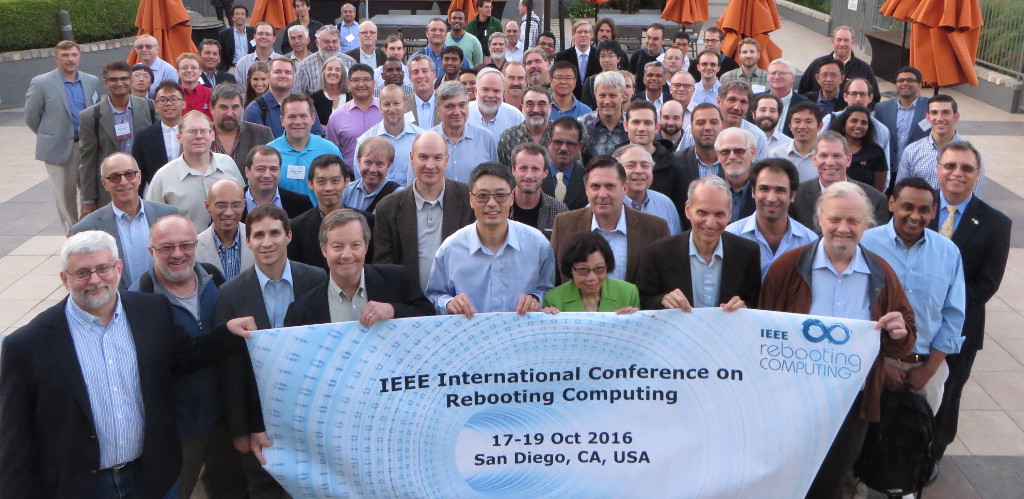Highlights of the 1st IEEE International Conference on Rebooting Computing (ICRC 2016)

ICRC 2016, sponsored by the Rebooting Computing Initiative (RCI) of the IEEE Future Directions Committee, was held 17-19 October, 2016, at the Hilton San Diego/Del Mar, in Del Mar, California. ICRC included 150 participants from the US, Europe, and Asia, with a goal of fostering continued improvements in future computer technology. The program for the conference is available on the ICRC Program page.
Many of the talks are accessible from IEEE.tv, and many of the papers are included in the ICRC Proceedings on IEEE Xplore.
ICRC built on a series of 4 RCI Summits held from 2013-2015. The conference chair was Stan Williams of HPE, and the program chair was John Paul Strachan, also of HPE. A second ICRC is being planned for Oct. 2017 in Washington, DC. Please check back for further information on ICRC 2017.
The conference opened with a review of the history of computing by Dr. Robert Leland of Sandia, focusing on the early role of John Von Neumann in establishing traditional digital computer architectures in the 1950s, followed by Moore’s Law scaling of transistors since the 1960s. But both of these are reaching practical limitations: Delays and power are dominated by shuttling bits between logic and memory, and smaller CMOS transistors are no longer cheaper and more reliable.
In order to continue to improve performance, we need to “reboot” computer technology itself, at all levels. This will not require discarding what we have developed, but rather taking a second look at a variety of evolutionary and revolutionary approaches that offer ways around the current limitations. ICRC included papers on the following:
- Neuromorphic or Brain-Inspired Computing
- Approximate and Stochastic Computing
- Adiabatic and Reversible Computing
- New Devices Technologies such as Memristive, Spintronic, and Superconducting
- Analog, Optical, and Quantum Computing
- Memory-Based Computing
- Heterogeneous Computing
Equally important as incorporating new devices and architectures, papers also addressed the need to co-design software and machine learning to take full advantage of the new hardware.
Keynote Talks
The ICRC was organized around 6 keynote talks on a variety of novel approaches to computing.
Prof. Neil Gershenfeld of MIT spoke about revolutionizing digital manufacturing, by developing software that merges computation with communication and 3D fabrication.
Prof. Leon Chua of UCLA, who first proposed the memristor more than 40 years ago, spoke about a general organizing principle for digital and analog systems, “local activity”.
Prof. Hideo Mabuchi of Stanford University introduced coherent photonic circuits that can be integrated together with electronic circuits
Prof. David Divincenzo of Aachen University (Germany) reviewed recent progress in research toward quantum computing systems, particularly those based on superconducting qubits.
Prof. Kwabena Boahen of Stanford spoke about neuromorphic chips that combine analog computing with digital communications.
Prof. Luping Shi of Tsinghua University (China) reviewed approaches to brain-inspired computing systems.
Oral Sessions
There were 45 contributed talks, presented in two parallel sessions, papers for which will be included in the Proceedings that will be available online through IEEE Xplore. These were organized into 4 sessions on neuromorphic computing, together with sessions on approximate computing, adiabatic computing, optical computing, quantum computing, cellular networks, superconducting and novel devices, error-tolerant logic, and memory-based architectures.
Poster Session
In addition, there were 19 posters presented at a poster session Monday evening, on a similar wide variety of topics.
WACI Session
Tuesday evening, after the Conference Banquet, there was a “Wild and Crazy Idea” (WACI) session, where 5 speakers gave brief presentations, often humorous, on an assortment of ideas for future computing. A repeated theme was that although John Von Neumann was very influential in the early history of computing, it is time to move beyond traditional ways of thinking about computers.
Government Speaker Session
A panel of speakers gave presentations on what US government agencies are doing to promote future computing, as part of the National Strategic Computing Initiative. These agencies included the Department of Energy, the Intelligence Advanced Research Projects Agency (IARPA), and the National Institute of Standards and Technology (NIST). In addition, an industry consortium (Semiconductor Research Corp.) is promoting university research in similar topics.
IARPA Workshop
After the end of ICRC, a workshop on Advanced Processors was sponsored by IARPA, with talks on Quantum Annealing and Analog Computing Systems. See the IARPA workshop page for further details.


